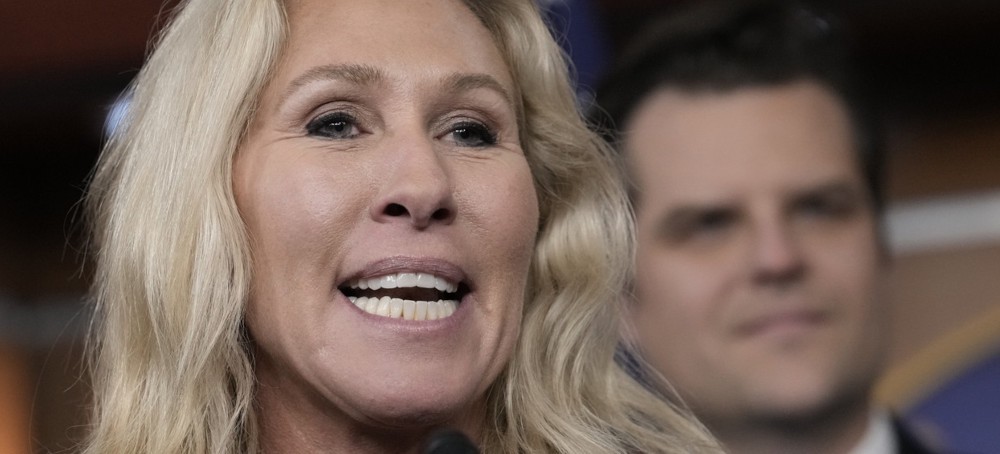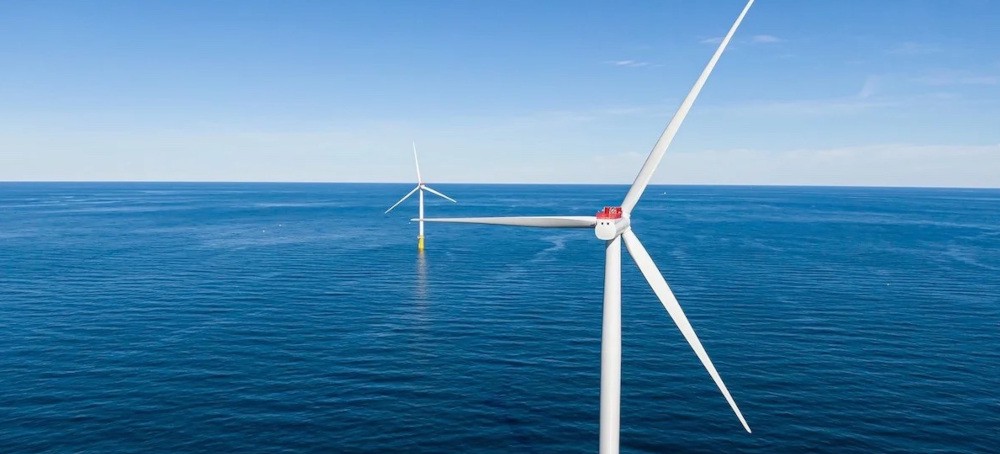Live on the homepage now!
Reader Supported News
Salem Media, which counts the conservative personalities Charlie Kirk and Sebastian Gorka among its radio hosts, has taken a pointed stance ahead of the midterm elections.
Now, the three men are joining a live speaking tour that will take them across Arizona, Georgia, Pennsylvania and other battleground states to promote those views — and Republican candidates — ahead of the Nov. 8 midterm elections.
The radio hosts and their tour are united by a common backer: Salem Media Group, a publicly traded media company in Irving, Texas. Mr. Metaxas, Mr. Gorka and Mr. Kirk have contracts with the company, which is also hosting the Battleground Talkers trip. The tour features more than half a dozen other conservative media personalities as well, including Hugh Hewitt and Dennis Prager, who also have deals with Salem.
Created as a Christian radio network nearly 50 years ago by two brothers-in-law, Salem has quietly turned into a conservative media juggernaut as it increasingly takes an activist stance in the midterm elections. The company has publicly said it wants a strong turnout of conservative voters for Nov. 8, and its hosts have amplified the messages of conspiracy theorists, including misinformation about the voting process
“The war for America’s soul is on the line,” Salem said in promotional materials for the tour. It added that the radio hosts were traveling to “influence those who are undecided.”
Salem, which has a market capitalization of nearly $45 million, is smaller than audio competitors like Cumulus Media and iHeartMedia, as well as conservative media organizations such as Fox News. But it stands out for its blend of right-leaning politics and Christian content and its vast network of 100 radio stations and more than 3,000 affiliates, many of them reaching deep into parts of America that don’t engage with most mainstream media outlets.
Salem also operates dozens of religious and conservative websites, as well as podcasts, television news, book publishing and a social media influencer network. The company, which describes its news content as “the antidote to the mainstream media,” has said it reaches 11 million radio listeners.
This year, it expanded into film by financing “2000 Mules,” a widely debunked but popular movie that claimed significant voter fraud in the 2020 presidential election. It was directed by Dinesh D’Souza, a conservative figure who has a deal with Salem, and features interviews with others who have shows on Salem. The company plans to publish a book version of the film this month.
The general public may not be familiar with Salem, “but their hosts are big names and they have huge reach, which makes them one of the most powerful forces in conservative media that hardly anyone knows about,” said Craig Aaron, president of Free Press, a nonprofit that fights misinformation and supports media competition.
Salem did not respond to requests for interviews. Phil Boyce, the company’s senior vice president of spoken word, said in a news release for the battleground states tour that “there has never been a more important midterm election than this one, and Salem is thrilled to be front and center, leading the charge.”
Mr. Metaxas, Mr. Prager, Mr. Kirk, Mr. Hewitt and Mr. D’Souza did not respond to requests for comment. In his response for comment, Mr. Gorka said The New York Times was “FAKENEWS fraud.”
Salem has faced legal challenges as its hosts have discussed conspiracy theories about voter fraud. Eric Coomer, a former executive of Dominion Voting Systems, a maker of election technology, has filed lawsuits against Salem, Mr. Metaxas and several media outlets since 2020 for defamation after being accused on air of perpetuating voter fraud and joining the left-wing antifa movement.
Nicole Hemmer, a political historian at Vanderbilt University and author of “Messengers of Right: Conservative Media and the Transformation of American Politics,” said Salem’s effect was far-reaching.
“They are using their many different properties for coordinated messaging to promote misinformation, which is undermining democracy,” she said.
Salem was started in 1974 with two tiny radio stations in North Carolina owned by two brothers-in-law, Edward G. Atsinger III and Stuart W. Epperson. Over time, they steadily added more stations across the country and sold blocks of airtime for sermons. Salem is now in most major radio markets.
The company went public in 1999 as the internet was rising. In its public offering prospectus, Salem said it would focus on acquiring digital platforms and cross-promoting content across its channels to attract new audiences.
In 2006, Salem bought the conservative political website Townhall.com; other deals for conservative sites followed, including HotAir, Twitchy and PJ Media. It purchased a publishing company, Eagle Publishing, in 2014 in a deal that included RedState, a conservative blog, and Regnery, a publisher with conservative authors like Ann Coulter and Laura Ingraham. Regnery said last year that it was “proud to stand in the breach” with Senator Josh Hawley, Republican of Missouri, when it agreed to print his book after Simon … Schuster dropped the title in the wake of the Jan. 6 Capitol riot.
This summer, Salem said it had added a podcast hosted by two “culture warriors,” Rob McCoy and Bryce Eddy of the talk show “Liberty Station.” In January, the company awarded its Culture Warrior of the Year award to Ron DeSantis, the Republican governor of Florida, who has made a point of goading liberals.
More recently, Salem has promoted to advertisers its “360-degree deals,” meaning that it can amplify messages across radio, podcasts, books, film and websites.
Politics were not new to Salem’s founders. Mr. Epperson unsuccessfully ran for Congress in 1984 and 1986 as a Republican. Mr. Atsinger contributed to Republican candidates like George W. Bush and Larry Elder, a Salem radio host who mounted a failed campaign in the California governor’s recall election last year. In Washington, Salem fought to remove regulatory hurdles that complicated its acquisition spree.
At the beginning of the year, Mr. Atsinger stepped down as Salem’s chief executive and became chairman, succeeding Mr. Epperson, who took on the title of chairman emeritus.
Salem’s executives largely stayed out of editorial decisions — until the Trump administration, said Ben Howe, a former employee of RedState; Craig Silverman, a former Salem radio commentator in Denver; and a third former employee, who declined to be identified for fear of retaliation.
In July 2017, Salem held an event at the White House, and several radio hosts interviewed top Trump administration officials. At a Salem reception at the Capitol the next day, the Senate Republican leader, Mitch McConnell, and the House Republican leader, Kevin McCarthy, gave speeches.
“There was a lot of closeness,” said Mr. Silverman, who attended the events. “McConnell and McCarthy praised Salem, and vice versa. It felt like some sort of team effort.”
In April 2018, Salem’s RedState blog fired several employees who had been vocal critics of Mr. Trump. The site’s unofficial slogan had long been “Take on the left. Clean up the right,” said Mr. Howe, a writer for the site who was one of those fired. “But one to two years into office, everything changed. It was like it was no longer good for business to be critical of Trump.”
Mr. Silverman said his radio show was cut off in November 2019 as he excoriated Mr. Trump over accusations that the president had pressured Ukraine to investigate Joseph R. Biden Jr., then a Democratic presidential candidate, by withholding aid to the country. Mr. Silverman said he was then fired.
Salem said in press reports at the time that such dismissals were not politically motivated, explaining that it had fired the RedState employees because of financial considerations and Mr. Silverman because he had appeared on non-Salem shows. Mr. Silverman said those appearances were allowed under his contract.
As Mr. Trump’s term wound down, Salem ran into financial pressure. In 2019, the company said four board members, including two of the co-founders’ sons, had resigned because “Salem has faced several unique financial headwinds and we are looking for ways to cut costs while not impacting revenue.” Both sons have since returned to the board.
In May 2020, the company moved to eliminate new hiring, suspend its dividend, reduce head count, cut pay and request discounts from vendors, blaming the pandemic for forcing it to conserve cash. It reported $11.2 million in forgiven loans from the government’s Paycheck Protection Program.
But Salem’s finances have improved since then. Its net income rose to $41.5 million in 2021 from a loss in 2020, while revenue increased to $258.2 million from $236.2 million a year earlier.
Salem’s political platforms are a bright spot. On an earnings call in August, Salem executives said that so far this year, political advertisers had spent nearly twice as much on Salem platforms as they did over the same period in the presidential election year of 2020, which had been the “biggest political year ever.” David Santrella, the chief executive, has predicted that “hot button” issues like abortion would probably boost ad revenue.
“The political environment has never been as interesting and as heated and intense as it is right now,” he said.
READ MORE  NATO did't agree to the transfer of Polish MiG-29 fighters to Ukraine. (photo: AFP)
NATO did't agree to the transfer of Polish MiG-29 fighters to Ukraine. (photo: AFP)
“It worked,” said the Chinese source.
“The (United States) decided that supplying aircraft was a step too far.”
According to Matthews, initially, Washington was positive about the transfer of MiG-29 jets by Poland in exchange for more modern Western fighter jets for Warsaw. But a day later, on March 8, the Pentagon abruptly reversed its position, pronouncing Poland’s proposal “not tenable.”
At the same time, as the author wrote, despite a dramatic escalation in supplies of money and military hardware, including NATO-standard 155mm artillery capable of firing guided shells and the High Mobility Artillery Rocket System, NATO has held back on providing attack aircraft, helicopters, NATO-standard tanks, long-range battlefield missile and cruise missile systems.
U.S. Secretary of State Antony Blinken said on March 6 that NATO members had the go-ahead to send fighter jets to Ukraine as the U.S. and allies continued their efforts to help Ukraine defend itself against Russia’s invasion.
He noted the U.S. authorities “were talking with our Polish friends right now about what we might be able to do to backfill their needs if in fact they choose to provide these fighter jets to the Ukrainians.”
The Biden administration had initially said the MiG-29 jets, which were deployed in Poland, could be transferred to Ukraine to provide air support, but instead the Pentagon sent them to a U.S. base in Germany, claiming that “the transfer of MiG 29 jets to Ukraine may be mistaken as escalatory and could result in significant Russian reaction that might increase the prospects of a military escalation with NATO.”
Later that day, Poland announced it would not transfer its fighter jets to Ukraine.
After a series of emotional statements by Kyiv and Warsaw, the United States, represented by Pentagon spokesman John Kirby, on March 9 finally rejected the transfer of Polish fighter jets to Ukraine.
READ MORE Amid record November heat over the Great Barrier Reef an expert on coral bleaching says he has never seen heat stress accumulating this early, but a 'well timed cyclone' in December could reduce the risk. (Photo: Sam NcNeil/AP)
Amid record November heat over the Great Barrier Reef an expert on coral bleaching says he has never seen heat stress accumulating this early, but a 'well timed cyclone' in December could reduce the risk. (Photo: Sam NcNeil/AP)
‘This does not bode well,’ reef scientist says, as highest November temperatures reached since 1985
Data from the US government’s National Oceanic and Atmospheric Administration (Noaa) shows sea surface temperatures over the northern parts of the reef have been the highest for any November on a record going back to 1985.
With the peak period for accumulated heat over the reef not expected until February, cooler weather conditions and cyclone activity before then could stave off a mass bleaching event.
Prof Terry Hughes, a leading expert on coral bleaching at James Cook University, said he had never seen heat stress accumulating on the reef this early, but a “well timed cyclone” in December could reduce the risk of bleaching.
“It is certainly the case that temperature records are tumbling. The warning signs are clear,” he said.
Last summer’s mass bleaching, declared by the Great BarrierReef Marine Park Authority (GBRMPA), was the first outbreak during a La Niña – a climate pattern that historically has kept ocean temperatures cool enough to avoid bleaching.
Hughes said: “According to Noaa’s predictions there’s a good chance we will see another back-to-back bleaching event. That was not supposed to be happening until the middle of this century.”
Rising ocean temperatures driven by human emissions of greenhouse gases mostly from burning fossil fuels caused six mass bleaching events along the reef in 1998, 2002, 2016, 2017, 2020 and 2022.
The bleaching of last summer that affected 91% of all individual reefs came after record ocean temperatures over the reef in December.
But according to Noaa data, there is currently more accumulated heat over the reef in the north than at the same time last year.
A current Noaa forecast suggests by late January large parts of the northern reef will likely see significant bleaching and, in the weeks that follow, some areas could see enough heat to cause coral death.
Bureau of Meteorology forecasts for sea surface temperatures also show heat accumulating in December and January over the reef.
Observations show current temperatures in the central and northern parts of the reef at about 2C above average.
Corals can recover from bleaching if temperatures are not severe. Scientists have seen a rise in the amount of coral over the reef in recent years – a recovery driven by fast-growing corals that experts say are also the most susceptible to bleaching.
GBRMPA’s chief scientist, Dr David Wachenfeld, said the authority was examining predictions from Noaa and the bureau “to understand what might occur over this summer”.
He said the conditions leading in to this summer were a concern, but said “local weather conditions will strongly influence sea surface temperatures throughout the summer – for example, if there is rain or cloudy conditions. Temperatures also tend to be hottest in February.
“Right now, it is too early to say what this summer will mean for the reef, though the current La Niña event is expected to increase rainfall along the east and north-eastern coast.”
He said the authority would be using satellite, aerial and in-water observations to monitor conditions and make forecasts.
Prof Ove Hoegh-Guldberg, a pioneering coral bleaching scientist at the University of Queensland, said: “This is about the steady but rapid rise in ocean temperatures and this is very worrying. This [heat stress] is happening many weeks earlier than usual – in the past it has been in January. I have had to check my watch.
“The fact it’s probably the warmest November on record [over the reef] and given what we know about heat stress on corals, this does not bode well.”
READ MORE  Ukrainian President Volodymyr Zelensky speaks as he and British Prime Minister Boris Johnson give a press conference on August 24, 2022 in Kyiv, Ukraine. (photo: Alexey Furman/Getty)
Ukrainian President Volodymyr Zelensky speaks as he and British Prime Minister Boris Johnson give a press conference on August 24, 2022 in Kyiv, Ukraine. (photo: Alexey Furman/Getty)
Zelenskyy delivered an impassioned speech via video link to the UN Security Council late Wednesday accusing Russia of "crimes against humanity" and suggesting the recent missile attacks were akin to "weapons of mass destruction."
"We expect a strong reaction from the world to today's Russian terror. We expect the reaction of partners. We expect the reaction of friends — not just observers," Zelenskyy said. "We expect the reaction of all those who really recognize the UN Charter."
The Ukrainian president also called on the council to adopt a resolution condemning any displays of energy terror — an unlikely development, given Russia's veto vote on the council.
Zelenskyy's plea comes as Moscow increases its attacks on energy infrastructure as winter takes hold in Ukraine. Russian missiles this week hit energy and civilian infrastructure throughout the country, causing blackouts in the capital Kyiv and other major cities.
"When the temperature is below zero outside, and tens of millions of people are left without electricity, heat and water as a result of Russian missiles hitting energy facilities, this is an obvious crime against humanity," Zelenskyy said.
Ukrainian Emergency Services said officials responded to 159 incidents throughout multiple regions and detected and removed 1,453 explosive objects on Wednesday alone.
The attacks on Wednesday killed at least 10 people, the Ministry of Energy said, according to CNN, and left much of the country without power. The country is working to restore power in several regions, but the work is "taking longer than previous attacks," because the Wednesday attack directly targeted power generation facilities, Ukraine's national company Ukenergo said, according to the outlet.
A newborn baby was killed in an earlier Russian missile attack that hit a hospital maternity ward in the Zaporizhzhia region late Tuesday, Ukrainian officials said. The baby boy was only two days old, Ukrainian First Lady Olena Zelenska said on Twitter.
The country's state emergency services said in a Wednesday statement that the baby's mother and the attending doctor were rescued from the rubble left by the impact of two rockets on the hospital located in the southeast village of Vilnyansk.
European Commission head Ursula von der Leyen announced during a Thursday press conference in Finland that the European Union is rapidly working to prepare an additional ninth round of sanctions against Russia over the Ukrainian invasion.
"These acts are war crimes," she said of Russia's attacks.
READ MORE Mary Peltola, D-Alaska, at the U.S. Capitol on Monday, Sept. 12, 2022. (Photo: Amanda Andrade-Rhoades/AP)
Mary Peltola, D-Alaska, at the U.S. Capitol on Monday, Sept. 12, 2022. (Photo: Amanda Andrade-Rhoades/AP)
Peltola made history in August, becoming the first Native Alaskan seated in Congress after she won the special election to replace longtime GOP Rep. Don Young, who died in March.
Peltola made history in August when she became the first Alaska Native seated in Congress after she won the special election to replace longtime GOP Rep. Don Young, who died in March at the age of 88.
Shortly after news broke that she had won a full term on Wednesday night, Peltola tweeted "WE DID IT!!!"
The outcome of the Nov. 8 election for the state's at-large House seat — as well as other contests, including for Senate — had been delayed for weeks because of Alaska’s new ranked-choice voting system where voters rank the candidates in order of preference.
After the first round of voting, Peltola led Palin by more than 20 percentage points, with Republican Nick Begich, a scion of one of Alaska’s most well-known political families, in third.
But because Peltola failed to win more than 50 percent, the voting went to a second round with Begich eliminated and his votes redistributed to those voters’ second choice.
Begich and Palin also competed in the August special election, making this contest a three-way rematch.
Peltola’s victory is a blow to GOP Leader Kevin McCarthy and the Republicans, who were handed a razor-thin majority in this month’s midterm elections. It means that a Democrat will hold the at-large House seat for the next two years, after Young and the GOP had controlled it for nearly five decades.
Young took over the seat in 1973 after Democratic Rep. Nick Begich, the grandfather of this year’s candidate by the same name, was presumed to have been killed in a plane crash.
Even before the race had been called, Palin, the late Sen. John McCain’s running mate in the 2008 presidential election, announced that she was the first person to sign a new ballot initiative to repeal Alaska’s ranked-choice voting system.
In the Senate contest, incumbent Republican Lisa Murkowski was re-elected Wednesday after ranked-choice runoff rounds, fending off a GOP challenger backed by former President Donald Trump.
READ MORE Twitter reinstated the personal account of far-right Rep. Marjorie Taylor Greene, which was banned in January for violating the platform's Covid misinformation policies (photo: J. Scott Applewhite/AP)
Twitter reinstated the personal account of far-right Rep. Marjorie Taylor Greene, which was banned in January for violating the platform's Covid misinformation policies (photo: J. Scott Applewhite/AP)
Online safety experts predict the move will spur a rise in harassment, hate speech and misinformation.
New Twitter owner Elon Musk said Thursday that he is granting “amnesty” for suspended accounts, which online safety experts predict will spur a rise in harassment, hate speech and misinformation.
The billionaire’s announcement came after he asked in a poll posted to his timeline to vote on reinstatements for accounts that have not “broken the law or engaged in egregious spam.” The yes vote was 72%.
“The people have spoken. Amnesty begins next week. Vox Populi, Vox Dei,” Musk tweeted using a Latin phrase meaning “the voice of the people, the voice of God.”
Musk used the same Latin phrase after posting a similar poll last last weekend before reinstating the account of former President Donald Trump, which Twitter had banned for encouraging the Jan. 6, 2021, Capitol insurrection. Trump has said he won’t return to Twitter but has not deleted his account.
Such online polls are anything but scientific and can easily be influenced by bots.
In the month since Musk took over Twitter, groups that monitor the platform for racist, anti-Semitic and other toxic speech say it’s been on the rise on the world’s de facto public square. That has included a surge in racist abuse of World Cup soccer players that Twitter is allegedly failing to act on.
The uptick in harmful content is in large part due to the disorder following Musk’s decision to lay off half the company’s 7,500-person workforce, fire top executives, and then institute a series of ultimatums that prompted hundreds more to quit. Also let go were an untold number of contractors responsible for content moderation. Among those resigning over a lack of faith in Musk’s willingness to keep Twitter from devolving into a chaos of uncontrolled speech were Twitter’s head of trust and safety, Yoel Roth.
Major advertisers have also abandoned the platform.
On Oct. 28, the day after he took control, Musk tweeted that no suspended accounts would be reinstated until Twitter formed a “content moderation council” with diverse viewpoints that would consider the cases.
On Tuesday, he said he was reneging on that promise because he’d agreed to at the insistence of “a large coalition of political-social activists groups” who later ”broke the deal” by urging that advertisers at least temporarily stop giving Twitter their business.
A day earlier, Twitter reinstated the personal account of far-right Rep. Marjorie Taylor Greene, which was banned in January for violating the platform’s Covid misinformation policies.
Musk, meanwhile, has been getting increasingly chummy on Twitter with right-wing figures. Before this month’s U.S. midterm elections he urged “independent-minded” people to vote Republican.
READ MORE  The first two turbines of Dominion Energy's coastal Virginia offshore wind project. (Photo: Dominion Energy)
The first two turbines of Dominion Energy's coastal Virginia offshore wind project. (Photo: Dominion Energy)
Now, a trio of right-wing organizations with a history of climate denial and fossil fuel funding is drafting the extremely endangered North Atlantic right whale into their crusade against an offshore Virginia wind installation.
“Unless BOEM [the Bureau of Ocean Energy Management] requires extensive, effective, unprecedented protection measures for the North Atlantic right whale immediately, this species is almost certainly headed toward extinction,” the American Coalition for Ocean Protection (ACOP) President David Stevenson said in a September statement. “With only a little more than 300 individual right whales alive today, this endangered species is in dire need of protection, and the Virginia Wind Project lies directly in their annual migration path. The project will require extensive daily maintenance by multiple service ships, and the potential for whale fatalities due to ship strikes is indisputable.”
On September 27, ACOP announced with the Heartland Institute and the Committee For A Constructive Tomorrow (CFACT) that they had retained counsel for a potential lawsuit against the wind farm on behalf of the whales.
The Coastal Virginia Offshore Wind project is a project of Dominion Energy that currently only consists of two turbines for testing, with more planned to be installed in 2024 and 2025, according to The Virginia Star. When it’s fully operational, however, it will consist of 176 turbines generating enough electricity for more than 600,000 homes, HuffPost reported.
The three groups are certainly correct that the North Atlantic right whales are in danger. The species has been in the midst of an Unusual Mortality Event since 2017 while also experiencing low birth rates. While the two main threats to the species are vessel strikes and entanglement in fishing gear, it’s not entirely irrational to worry that offshore wind turbines could pose an additional threat.
“I’m concerned that the whales are going to bear the brunt of this and that we may not know about those effects for years,” Oceana Campaign Director Gib Brogan told HuffPost. “With this species in the critically endangered state that it is, they don’t have years to learn those effects. It’s high stakes on a lot of fronts, both financially but also for this species. And we are looking to the government to be the stewards here for the whales and make sure their needs are taken care of.”
However, there are reasons why the three groups threatening a lawsuit are not the most believable spokespeople for the whales.
“These groups lack credibility on environmental issues. They are climate change deniers and oppose offshore wind for political purposes,” Dominion Energy spokesperson Jeremy Slayton told The Virginia Star.
One big issue is their history. The Heartland Institute has long been peddling climate denial and pro-fossil fuel messaging: In 2017, for example, it sent a book and DVD titled Why Scientists Disagree About Global Warming to around 200,000 K-through-12 teachers. CFACT also has a history of dismissing climate concerns and promoting oil and gas development, according to HuffPost. ACOP has sued to block wind projects up and down the Atlantic coast, and its president Stevenson is a former DuPont executive who is also a policy adviser at the Heartland Institute and director of the Caesar Rodney Institute’s Center for Energy Competitiveness. The Heartland Institute, CFACT and the Caesar Rodney Institute have all received donations from the fossil fuel industry in the past.
In addition, members of the triad have all spoken against measures that would concretely help North Atlantic right whales today. In promoting offshore oil and gas drilling, Stevenson dismissed the impacts of seismic testing and oil spills on marine life. CFACT also opposes a proposal by the National Oceanic and Atmospheric Administration (NOAA) to pass new speed limits for boats to protect right whales.
Finally, the organizations all engage in climate denial, but the climate crisis is the ultimate driver behind the North Atlantic right whales’ decline, as the incursion of warmer waters into the Gulf of Maine devastated their food source and forced them to eat in less protected waters.
To build the renewable energy capacity necessary to avoid further climate impacts while also protecting the endangered cetaceans, Dominion Energy is working with NOAA, Duke University and the Regional Wildlife Science Collaborative, The Virginia Star reported.
“For our Coastal Virginia Offshore Wind project, we have taken concrete steps to protect the right whales and their migration path. No underwater construction will occur during the migration season, and the turbines will be spaced about a mile apart to avoid disturbing their path,’ Slayton said.
Follow us on facebook and twitter!
PO Box 2043 / Citrus Heights, CA 95611



No comments:
Post a Comment
Note: Only a member of this blog may post a comment.